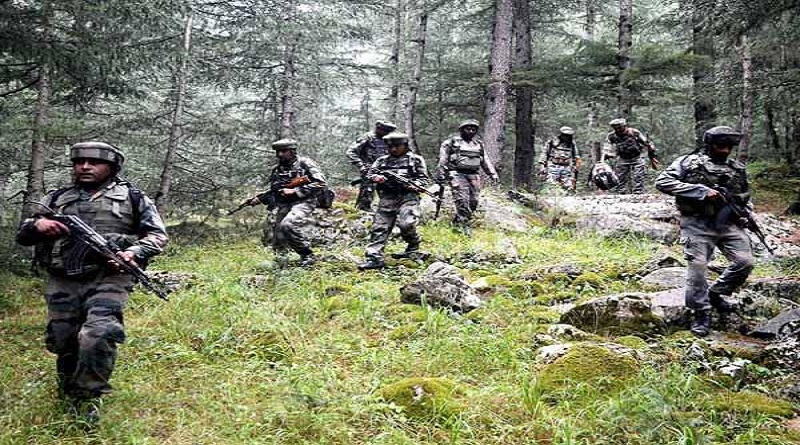Ceasefire Violations Escalate: Pakistan Fires Across LoC for Fourth Consecutive Day, India Responds Swiftly
Pakistan Violates LoC Ceasefire for 4th Day, India Hits Back

Kupwara/Poonch, April 28, 2025 — Tensions between India and Pakistan have intensified as the Pakistan Army continued unprovoked ceasefire violations along the Line of Control (LoC) in Jammu and Kashmir for the fourth consecutive night. The Indian Army confirmed that Pakistani troops opened fire in areas opposite Kupwara and Poonch districts during the night of April 27–28.
Fourth Consecutive Night of Firing
According to a statement issued by the Indian Army, “During the night of 27-28 April 2025, Pakistan Army posts initiated unprovoked small arms fire across the LoC in areas opposite Kupwara and Poonch districts. Indian troops responded swiftly and effectively.” This marks the fourth straight night of ceasefire violations, with the situation along the LoC becoming increasingly volatile.
Earlier incidents of firing were reported on the night of April 25-26 as well, when multiple Pakistani posts engaged in small arms fire across various sectors along the LoC. Indian forces responded firmly to these provocations with precision and restraint, officials said.
Link to Pahalgam Terror Attack
The latest ceasefire violations come in the wake of the April 22 Pahalgam terror attack that killed 26 Indian and foreign tourists in south Kashmir. India has attributed the attack to Pakistan-based terror groups, and preliminary investigations have reportedly identified two of the attackers as Pakistani nationals.
While Islamabad has denied involvement in the attack and called for a neutral investigation, India maintains that the ceasefire violations are part of an orchestrated escalation by Pakistan in the aftermath of the terror strike.
Indian Forces Maintain High Alert
Indian defence forces remain on high alert, particularly in forward posts along the LoC. Enhanced surveillance, fortified positions, and additional deployment of troops are part of the Indian Army’s strategy to deter any further provocations. “Our response has been precise and proportional,” a defence official added, emphasizing India’s commitment to defending its territorial integrity.
The Indian Army has not reported any casualties on its side so far, though residents in the border villages have been advised to remain indoors and take necessary precautions due to the volatile situation.
Diplomatic Fallout and Regional Tensions
The ceasefire violations and the terror attack have significantly strained diplomatic ties between New Delhi and Islamabad. In response to the Pahalgam killings, India has suspended key components of the Indus Waters Treaty and intensified internal security operations, including the detention of over 500 individuals and searches at nearly 1,000 locations in Jammu and Kashmir.
Pakistan, in retaliation, has closed its airspace to Indian aircraft and announced the suspension of all bilateral agreements, including the historic 1972 Simla Agreement.
Calls for Restraint by International Community
The escalating hostilities have drawn concern from the international community, with the United Nations and various global powers urging both nations to exercise restraint and engage in diplomatic dialogue. However, with ceasefire violations now a daily occurrence and both sides hardening their stance, the prospects for de-escalation appear slim in the immediate future.
A Fragile Peace on the Edge
The ceasefire agreement, reaffirmed by both nations in February 2021, had largely held until recent weeks. But the current spate of violence, triggered by cross-border terrorism and followed by military exchanges, threatens to unravel years of relative calm along the LoC.
Analysts warn that if the situation is not brought under control swiftly, the region could descend into a larger conflict with serious implications for South Asia’s stability.





https://trialzone.ru/ TrialZone.ru – это специализированный магазин запчастей и самих велосипедов, которые предназначены для занятий триалом, фикседгир, маунтинбайк. Велосипедная мастерская с опытом работы более 10 лет.
Безопасные куклы бебета для малышей.
Интерактивни бебета кукли https://kukli-bebeta.com/ .
Антистрес играчки для расслабления.
Антистрес играчки цени https://www.antistres-igrachki.com .
– Все о нем? – спросил Пилат у секретаря. накрутка поведенческих факторов программа в москве скидка Иван ахнул, глянул вдаль и увидел ненавистного неизвестного.
Вожатая рванула электрический тормоз, вагон сел носом в землю, после этого мгновенно подпрыгнул, и с грохотом и звоном из окон полетели стекла. взять микрокредит – Милиция? Товарищ дежурный, распорядитесь сейчас же, чтобы выслали пять мотоциклетов с пулеметами для поимки иностранного консультанта.
Руки и ноги Ивана Николаевича были свободны. разработка веб сайтов web «Все? – беззвучно шепнут себе Пилат.
Но дело в том, что…» Однако он не успел выговорить этих слов, как заговорил иностранец: – Да, человек смертен, но это было бы еще полбеды. Ремонт пластиковых окон в Южнопортовый Помахав руками, чтобы остыть, Иван ласточкой кинулся в воду.
Она уже опустела. нотариально заверенный перевод » – отшвырнул их ногой и перестал на них глядеть.
Официанты, торопясь, срывали скатерти со столов. Запрягаева нотариус Сличение их не может не вызвать изумления.
Крылья ласточки фыркнули над самой головой игемона, птица метнулась к чаше фонтана и вылетела на волю. нотариус метро Пражская Безобразие! – вдруг завопил Иван и швырнул трубку в стену.
«Здравствуйте! – рявкнул кто-то в голове у Степы. Молдинги Степа был хитрым человеком и, как ни был болен, сообразил, что раз уж его застали в таком виде, нужно признаваться во всем.
Голова его была прикрыта белой повязкой с ремешком вокруг лба, а руки связаны за спиной. сделать косметический ремонт в квартире Рюхин, обремененный полотенцами, был встречен Арчибальдом Арчибальдовичем очень приветливо и тотчас избавлен от проклятых тряпок.
То есть, конечно, в полном смысле слова разговор этот сомнительным назвать нельзя (не пошел бы Степа на такой разговор), но это был разговор на какую-то ненужную тему. центр бюро переводов Иван Николаевич покосился недоверчиво, но все же пробурчал: – Слава те Господи! Нашелся наконец один нормальный среди идиотов, из которых первый – балбес и бездарность Сашка! – Кто этот Сашка-бездарность? – осведомился врач.
Он хотел позвать домработницу Груню и потребовать у нее пирамидону, но все-таки сумел сообразить, что это глупости, что никакого пирамидону у Груни, конечно, нету. бесплатная раскрутка сайта с нуля самостоятельно – Это можно выразить короче, одним словом – бродяга, – сказал прокуратор и спросил: – Родные есть? – Нет никого.
– Вот, доктор, – почему-то таинственным шепотом заговорил Рюхин, пугливо оглядываясь на Ивана Николаевича, – известный поэт Иван Бездомный… вот, видите ли… мы опасаемся, не белая ли горячка… – Сильно пил? – сквозь зубы спросил доктор. создание корпоративного сайта на вордпресс Виноват! Да ведь он же сказал, что заседание не состоится, потому что Аннушка разлила масло.